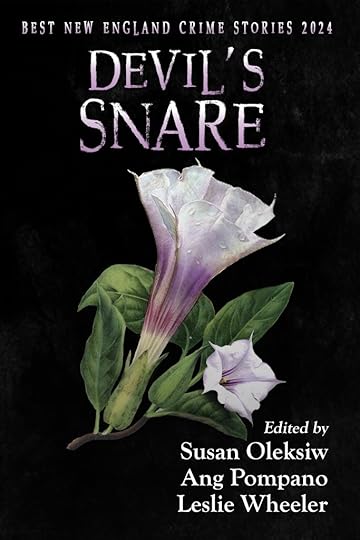The Power of Last Lines in Fiction and a #Giveaway
by Barb, first December ever in Key West
My friend Leslie Wheeler is here today with an interesting post about last lines in fiction. Leslie is writing in support of the latest release of Best New England Crime Stories, The Devil’s Snare. One lucky commenter below will receive a copy.
For six years I was a co-editor, co-publisher of the Best New England Crime Stories series, along with Leslie and our friends Kat Fast and Mark Ammons. It was one of the most interesting and fun things I’ve ever done and I learned a ton about writing, editing, and publishing.
Fast forward nine years and there have been numerous changes on the ownership and editorial fronts but it makes me so happy this wonderful annual collection persists, now with editors Susan Oleksiw, Ang Pompano, and Leslie Wheeler.

Take it away, Leslie!
The Importance of Last LinesAs a writer and editor, I am well aware of the importance of first lines in novels and short stories. They are the invitation writers send prospective readers to enter their fictional worlds. That invitation often involves a question or problem that must be resolved. If done right, readers accept the invitation. In last lines, the author bids readers good-bye, and either leaves them satisfied they took the journey, or not. Some last lines in novels have been so effective that they are stamped on readers’ collective memory. For example, Gone with the Wind ends with Scarlett O’Hara’s response to Rhett Butler’s equally famous: “My dear, I don’t give a damn” with these words: “I’ll go home and I’ll think of a way to get him back. After all, tomorrow is another day.”
Writers of short stories, however, don’t have the luxury of length to dole out their openings or closings. They must find not only the right words but the right number of words for the beginning and end. I would argue that last lines can either make or break a story. What makes a successful ending? Here are three examples taken from stories, which appear in Devil’s Snare, Best New England Crime Stories 2024, co-edited by Susan Oleksiw, Ang Pompano, and myself.
“The Business of Others” by Gabriela Stitler ends thus:
“It’s over,” he said.
“I know.”
“I’m sorry.” He said it so softly I almost didn’t hear.
So softly we could pretend he didn’t need to say it.
This is a low-key but telling ending to a story about a couple who watch their neighbors ruin their lives in a love triangle gone bad, and must find a way forward themselves. The last lines show us that they will probably succeed, having learned from the mistakes of others.
But stories don’t have to end with a change in behavior of a main character to work. In Paula Messina’s “Fish Eyes,” a young man struggles to find out why a fishmonger is in danger. Although he is successful in finding a resolution to the problem, he realizes that the fishmonger can’t stop the behavior that got him in trouble in the first place.
“Nothing, no one would ever stop Mr. Clemente from reveling in a beautiful women’s eyes.”
This humorous ending is in keeping with the overall light-hearted mood of the story.
Stories can also end well even when the main character fails to achieve his chief goal. In “Chinese Exclusion” by Michael Ditchfield, a young, newly married lawyer cannot save a wrongfully accused man from the death chamber, but succeeds on the home front.
“We needed more justice. . . Then I got off my internal soap box and surprised Gladys: I put in the laundry.”
Here, the shift from the lofty to the mundane is a nice twist.
As I hope these examples demonstrate, there is more than one way to write effective last lines.
Readers: Do you have favorite last lines from novels or short stories? One of the commentators will receive a free copy of Devil’s Snare.
About The Devil’s SnareDevil’s Snare brings together 24 crime stories featuring the innocent to the professional hitman in circumstances that highlight shrewd, the clever, the professional, the accidental, the reluctant sleuth and more. Authors are Christine Bagley, Nancy Brewka-Clark, Bruce Robert Coffin, Hans Copek, Michael Ditchfield, Christine Eskilson, Kate Flora, Connie Johnson Hambley, Sean C. Harding, Kathryn Marple Kalb (Nikki Knight), Chris Knopf, Alison McMahon, Paula Messina, Susan Oleksiw, Eugenia Parrish, Ang Pompano, Stephen D. Rogers, Clea Simon, Sarah Smith, Shelagh Smith, Gabriela Stiteler, Mo Walsh, and Leslie Wheeler.
Crime Spell Books Facebook page
About Leslie Wheeler
Leslie Wheeler is a co-editor/publisher at Crime Spell Books, which publishes an annual anthology of Best New England Crime Stories. She is also the author of two mystery series: the Miranda Lewis Living History series and the Berkshire Hilltown Mysteries. She divides her time between Cambridge, Massachusetts, and the Berkshires, where she writes in a house overlooking a pond.



